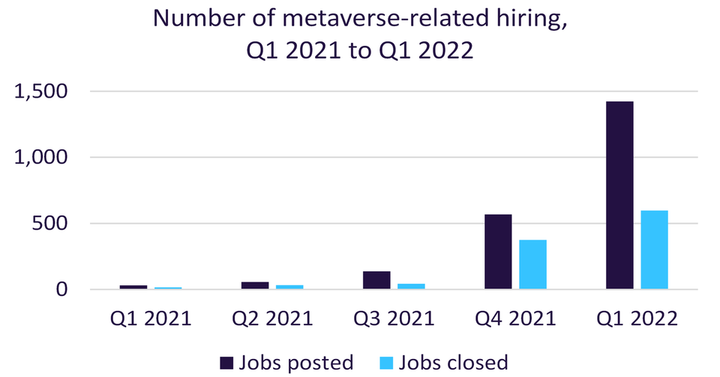Future of Work
Enhancing the future of work in the metaverse
GlobalData’s Rupantar Guha, Principal Analyst, Thematic Intelligence, and Shabnam Pervez, analyst, Thematic Intelligence present some insights into the metaverse and how these may impact the future of work

The Thematic Intelligence team at GlobalData held a webinar on the metaverse in February 2022. It defined the metaverse, highlighted its challenges around data privacy, and analysed its impact on telecom providers and retailers. An accompanying Thematic Intelligence report – The Metaverse – was published in May 2022.
What is the metaverse?
The metaverse is a virtual world where users share experiences and interact in real-time within simulated scenarios. The metaverse is still largely conceptual but could transform how people work, shop, communicate, and consume content.
With no standard definition yet, the metaverse means different things to different people depending on the nature of their business. This means most companies can make the metaverse be whatever they want it to be.
The metaverse brings together a range of next-generation technologies from cloud computing to artificial intelligence (AI), blockchain, cybersecurity, the Internet of Things (IoT), virtual reality (VR), augmented reality (AR), and digital twins. By 2030, the metaverse will be a $13 trillion opportunity, according to Citi Global Insights.
The metaverse is still largely conceptual
It means different things to different people and involves all the technologies in this chart

Source: GlobalData
The metaverse will be critical to the future of work
The hype around the metaverse is focused mainly on consumer use cases. Gaming and social media companies are at the vanguard of metaverse development, but enterprises will lead the charge in the next three years. This shift will be driven by the future of work and digital transformation initiatives across sectors ranging from retail to healthcare and financial services. Big Tech is championing the metaverse, with Microsoft and Meta promoting it as the ideal environment for hybrid working. New enterprise use cases will emerge as Big Tech strengthens its metaverse capabilities and start-ups develop data visualization, collaboration, and training solutions. Companies from various sectors, including accounting, are investing in the metaverse to engage with customers, expand brand awareness, and identify new revenue streams.
The metaverse and accounting companies
Several large accounting companies have moved into the metaverse. For example, in Q4 2021, PwC announced its purchase of a virtual plot of land from The Sandbox, with plans to advise clients on the challenges presented by the metaverse. In Q1 2022, Prager Metis built a virtual headquarters in Decentraland to advise its clients on tax and accounting issues. Subsequently, JP Morgan opened a customer lounge in Decentraland named Onyx to boost social engagement. In addition, HSBC bought a plot in The Sandbox to engage with sports, esports, and gaming fans. Deloitte is also testing a virtual campus that features offices and conference centers for employee onboarding and collaborations.
These initiatives aim to attract Generation Z – a segment of our population aged between 10 and 25. This cohort represents the next generation of customers and employees. Their characteristics differ from previous generations: they are digital natives, having grown up with social media; they place great trust in computers. This leads them to favor a decentralized internet (i.e., Web3). Therefore, accounting companies are trying to keep up with them.
An early move into the metaverse will help accounting companies:
- align with industry trends and flex their technology muscles;
- organize immersive collaboration, training, and conferences in virtual offices;
- educate corporations and governments on cryptocurrency-based banking and audit;
- enhance consulting and auditing processes to guide clients on digital transformation, intellectual property, M&As, taxation, and ESG;
- use AI to analyse data generated on metaverses and attract Gen Z with personalized offers;
- improve brand recognition with immersive advertising and non-fungible tokens (NFTs);
- partner with crypto and NFT firms to develop a common language for the future of accounting;
- collaborate with regulators and tech companies to design data privacy and safety regulations.
GlobalData anticipates that most metaverse platforms will integrate all three payment options, while blockchain-based metaverses will prefer cryptocurrencies. The development of metaverse-based marketplaces will trigger competition between centralized banking services (e.g., traditional banks) and decentralized finance (DeFi) providers. It is too early to say who will win in the long run, but the gap between the two will shrink as the metaverse matures. Interestingly, leading banks like JP Morgan Chase, Barclays, Morgan Stanley, and Goldman Sachs are investing in cryptocurrencies to prepare for the metaverse, offering both fiat currencies and cryptocurrencies.
Fintech start-ups are also developing metaverse-focused services to attract Gen Z users. eToro’s MetaverseLife is a smart portfolio for investors interested in stocks, cryptocurrencies, and other projects within the metaverse. Tintra’s Web3 banking platform offers dataless cryptographic processes and blockchain-powered verification for seamless transactions in the metaverse.
The metaverse will be a digital economy where users can buy and sell products and services. This will require effective payment solutions embedded in metaverse platforms. There will be three key payment channels for settling transactions in the metaverse:
Mobile payments offered by tech players such as Amazon, Google, Apple, and Tencent. Card payment networks made available to consumers by issuing banks, which partner up with card scheme providers such as Visa and Mastercard. Cryptocurrencies, like Bitcoin, Ethereum, and Mana (offered by Decentraland).
Metaverse-related hiring trends
GlobalData’s job analytics database reveals that metaverse-related job postings across all sectors increased from 30 in Q1 2021 to over 1,400 in Q1 2022. Tech companies (e.g., Meta, Roblox, Microsoft) are the leaders in metaverse-related job postings. They are trailed by companies from other sectors like media (Publicis, Dentsu, Pocket Worlds), banking (Wells Fargo, HSBC, Morgan Stanley), and consumer goods (AB InBev, Nestle, P&G).
Companies are rapidly hiring for metaverse skillsets
Metaverse-related job postings grew from 30 in Q1 2021 to over 1,400 in Q1 2022

Source: GlobalData Job Analytics database
Summary
While the metaverse is in its infancy, it has the potential to be the next mega-theme in digital media. As the underlying technologies of the metaverse mature and new use cases emerge, the theme will disrupt all sectors, including accounting.
While early metaverse applications are precarious, they will only improve as the theme evolves. Accounting companies must understand the theme early, given their central role in metaverse-related payments, regulations, and consulting. Failure to act on time will lead any company to fall behind its peers or be disrupted by tech companies in the long run.

Rupantar Guha
Principal Analyst
Thematic Intelligence at GlobalData

Shabnam Pervez
Analyst
Thematic Intelligence at GlobalData